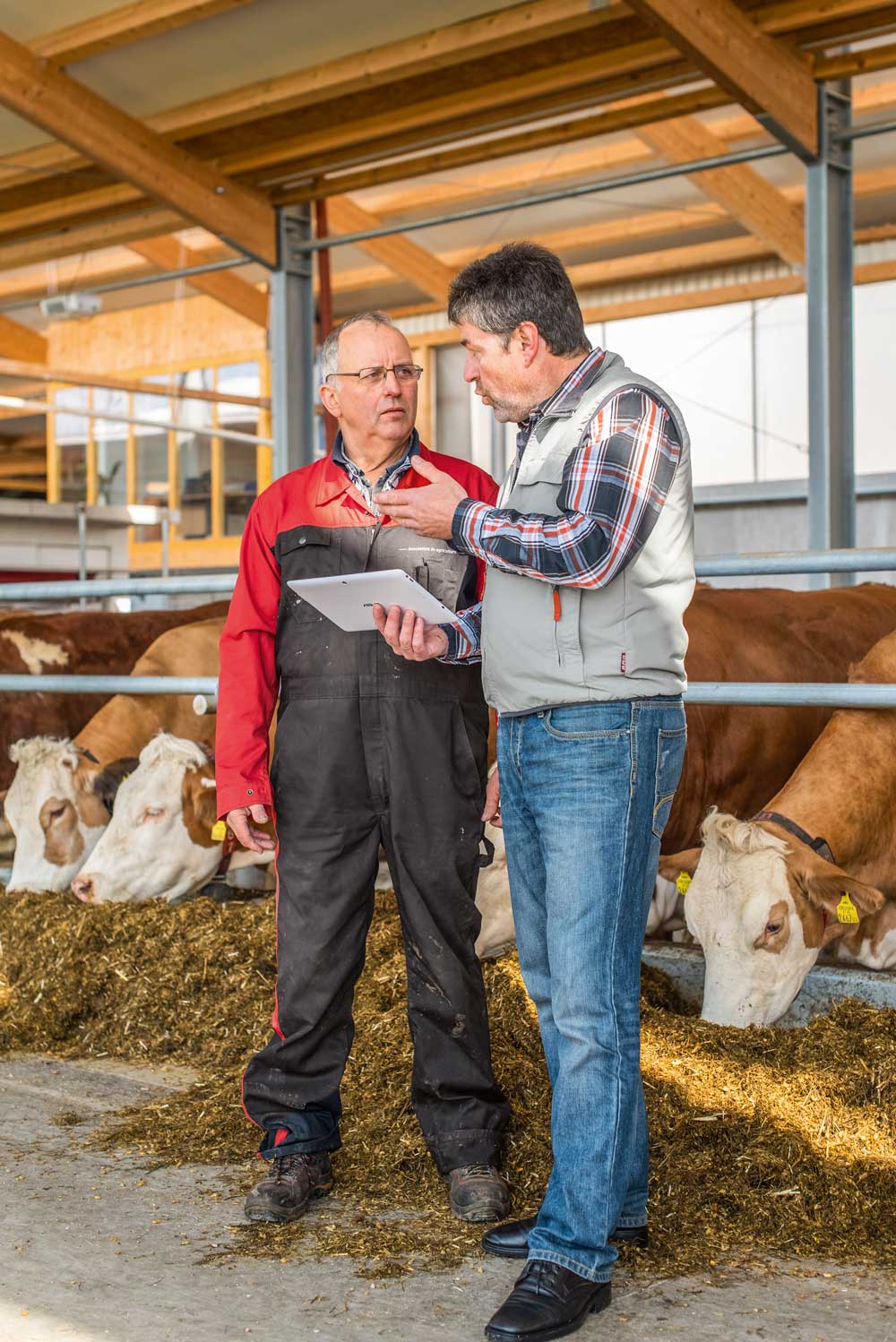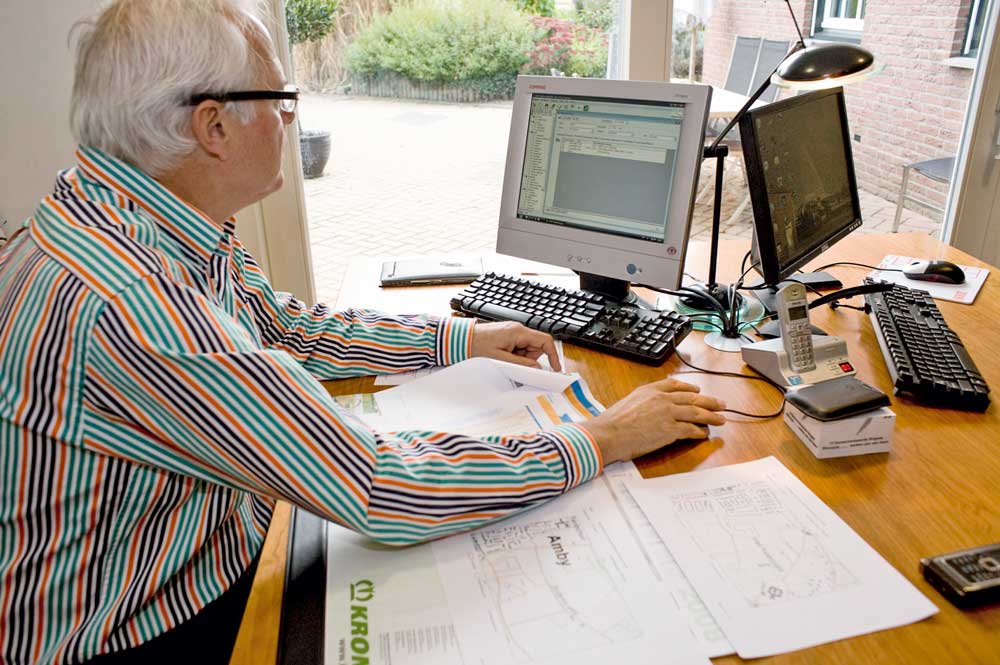Entrepreneur: bettering your business skills
By Enno Karstens
There he stands: the entrepreneur. I see him – or her - before me: during farm visits, talks with bankers, important contract negotiations, difficult discussions with employees - or clarifying final points before handing on the farm business to a successor. What will the future hold for the new farmers? Will they succeed as entrepreneurs over the next 10, 20, 30 years on their farm, with the equipment and the enterprises they’ve chosen?
Classical key factors for a good manager
Considered here should be supplementary capabilities that have growing importance in business success. Three of these are well known but still demand special attention:
- Efficiency in production processes: Here, orientation should be on the best businesses in horizontal comparison. Continual improvement should be pursued, even in critical periods caused by poor sales, disease or bad weather. This is where fine-tuning is required: for soil fertility, mechanisation levels, herd management or animal husbandry. Particularly where expansion is being planned in large steps, it is something of an art staying in control and maintaining high performance. Fundamental requirements for the manager under these conditions include a solid education, keeping in touch through continual further education and training courses and, above all, maintaining inner motivation and drive
- Capabilities for leadership and management: Being successful means: making decisions, setting priorities, workforce leadership, permanent awareness of key figures, representation of the business internally and externally, testing business strategy and adjusting to maintain liquidity, rentability and stability. Can the lone entrepreneur manage all this? Or can he, or she, learn to do so? Unfortunately, nowadays there’s not much leeway for making mistakes before the business ends up in the bank’s restructuring department!
- Available own capital and the business financial structure: It‘s almost impossible to achieve success with a farm business that’s insolvent and has no own capital reserves. Such a challenge requires outstanding capabilities in the aforementioned areas. And an exceptional business plan.
What’s important in addition to business leadership?
In commerce, this question is always associated with changes that have developed through the increasing complexity and dynamic within the economy. Things to be prepared for as entrepreneur include short lifecycles, discontinuous change, continuous price reductions, lack of customer loyalty, choosy employees, transparency, business pressures and high financial expectations. Recognised as crucial factors for success here are rapid reactions, innovation, operational excellence, close contact with customers and good customer relations, top quality working conditions, ethical and socially-aware behaviour and sustainable added value.
Does this also apply to farming and its production factors? So far, life cycles in agricultural production have tended to be lengthy and changes in production more likely to be gradual. And the prices, too, remained relatively stable, thanks to state support measures. Just think back to the milk quota period.
The sector »agriculture« is changing
In the past, it wasn’t necessary for farmers to occupy themselves with entrepreneurial skills. Their task was simply to achieve, or aspire to achieve, production within clearly regulated markets. That generation of farmer and its successors grew up with a production oriented mindset.
There’s nothing wrong with this. That’s what the market wanted at that time. Today’s required reactions and mindset are, however, very different.
Optimal production is the requirement for farmers now. Marketing must be as efficient as possible. Farmers must sell themselves well. And manage their workforce correctly. Not only the local, but the global markets, should be kept in mind, trading on the stock exchange is possible, strategic cooperation can be developed and marketing skills improved. And that’s only the beginning.......
What will make a successful entrepreneur in the future?
Some ideas on this:
- The value created by the activities of a firm, a classical field this, increases according to the level of own capital invested. But support comes not only from investments, 5-year plans have to be presented, different scenarios investigated. Break-even points have to be identified and then calculated for. Risks assessed and secured.
- In future there will possibly be more focus on the responsibilities, not only those borne by the farmer but also by the farming family and workforce too, not least because of increasing enterprise complexity. The individual cannot manage this alone. In farm offices, I notice quite a few emergency protocols. Unfortunately, most are not filled out. Who takes over when the boss is sick, or away on holiday? What happens when a farming family marriage breaks up?
- Those responsible have also to find answers to questions on the why and wherefore, the effectiveness and sustainability. Not for nothing has »burn-out« been known for a long time in agriculture.
- Alongside ability, also required are ideas and innovation capacity. The motto »that‘s the way it always was« isn’t much help. Not only standing is important, but increasingly crucial are also reaction capability and the ability to develop solutions together with others. Happy are those bosses who already have self-reliant and resourceful employees.
- A talent for staff leadership: how to treat my workers with respect, how best to motivate them, assess their capabilities? How can I delegate? I can envisage many farmers that know the pain of getting things wrong here.
- It’s also important to understand stakeholders: e.g. tenants, investors, cooperation partners. And without question, customer contact becomes more important too. All this is still foreign ground for many farmers. Nearness to customers will be more important. Unfortunately, the pressures of work mean very few have occupied themselves with all of this.
- But not only the right social behaviour becomes increasingly essential. So too, does ethical behaviour. Successful entrepreneurs must consider questions of sustainable value creation and also learn, when necessary, to defend their actions in arguments.
How can the adviser support farmers?
There’s no doubt that the specialist adviser is of great importance in offering help fine tuning business fixed costs and financing. Among the questions helped with are:
- How is growth of own capital secured?
- What’s the best way of achieving acceptable rewards for labour input and invested capital?
- How can liquidity, rentability and stability be secured?
A lot of weight should also be given to procedural advice. Here, the focus on is people. Fiscal legislation tells us that the entrepreneur role includes both initiative and risk. The entrepreneur »carries the can« when things go wrong. How does the adviser help here?
The farmer’s responsibility load may be lightened through an appropriate qualification-backed coaching session, or the adviser can point the way to experts in this field. This is where some advisers fail because, somehow, they do not want other specialists in on »their« case, an attitude that can have fatal results for a business. »Teamwork in advising« must be encouraged.
Support farm business development. Don’t dominate it!
The adviser should offer helpful support during structural changes, but should wait until help is explicitly requested. And here it pays to keep a special eye open for the surfacing of problems – interior or exterior ones. It remains important not to overstep the advisory role when helping with difficult decisions. There are indeed tax consultants or specialist advisers who act more like managing strategists or finance ministers in this respect. This cannot be the right way.
The agricultural adviser should stand by the farmer client and help when help is requested. For instance in matters of employee management. How best to behave and be effective in interactions within the farming family, the work team, the respective business cooperations? Who suggests the right questions to ask? Who advises on effective changes in attitude? It’s often heard that the adviser should personify »a clear mirror« i.e. supporting the roles and responsibilities of the client independently of own feelings or mood, worries or problems.
This can be particularly difficult in the face of disputes and conflicts, both interior and exterior. And there are more of those than you may think! The present environment means there’s plenty need for help in this direction.
Such themes are dealt with in specialist circles under the heading »agile management« and have had a central importance in commercial management consultancy for many years. But farm advisers have also been working with the subject for some time too. And I think this is important because those strategies, based on the individual strengths of farmer clients, have great influence on success.
Successful farming demands complex competences
Agriculture is in continual flux with enormous changes thus required in vocational requirements. Key abilities for farm managers can be summed up as:
- Precision in all actions, whether planning risk assessment, prognosis, production or administration.
- Persistency and diligence in pursuit of targets.
- Modesty, lack of self-importance and respectful treatment of everyone involved: whether employees, business partners or the family members working with you.
Managing a farm business represents an outstanding vocation within a highly volatile environment – full of new opportunities and not without risk. Those who can correctly assess their situation and work towards preparing solidly grounded decisions, showing courage in negotiations and staying active in networking, remain entrepreneurs with a future.





